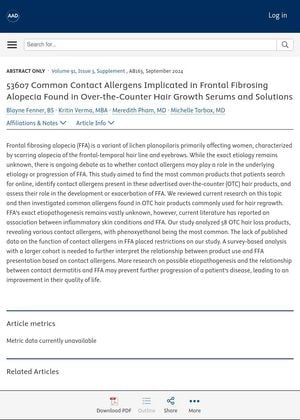Common Contact Allergens Implicated in Frontal Fibrosing Alopecia Found in Over-the-Counter Hair Growth Serums and Solutions
September 2024
in “
Journal of the American Academy of Dermatology
”

TLDR Phenoxyethanol in hair growth products may be linked to frontal fibrosing alopecia.
This study investigates the potential role of contact allergens in the development or exacerbation of frontal fibrosing alopecia (FFA), a scarring alopecia affecting the frontal-temporal hairline and eyebrows, primarily in women. Researchers analyzed 58 over-the-counter hair loss products and identified phenoxyethanol as the most common contact allergen. The study highlights the lack of published data on the function of contact allergens in FFA, suggesting that a larger survey-based analysis is needed to better understand the relationship between product use and FFA. Further research into the etiopathogenesis and the link between contact dermatitis and FFA could help prevent disease progression and improve patients' quality of life.




